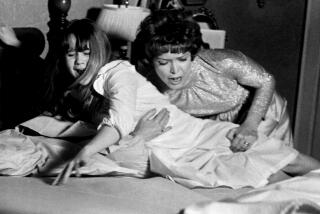Koranic Healing Thrives Despite Debate : Gaza Strip: The fundamentalist practice of exorcism gains in popularity in spite of Islamic leaders’ complaints that such practioners are charlatans who should be prosecuted.
- Share via
GAZA CITY, Gaza Strip — The smell of incense wafted through the clinic as a bearded clergyman pushed his knee into the stomach of a patient squirming on a green velvet blanket.
The healer whipped the man’s sides and feet with a stick and recited verses from the Koran, the Muslim holy book.
“There is no God but Allah. In the name of Allah, leave him, you jinn,” hissed Sheik Ramadan Saifi as he tried to exorcise the evil spirit that he said had possessed the mentally ill 45-year-old man for eight years.
Saifi runs one of about a dozen Koranic clinics that have sprung up in the Gaza Strip recently in another sign of the religious fundamentalism taking root among Palestinians.
During the Israeli occupation, many healers operated from home for fear they would be targeted by the Israelis as Islamic zealots. Many do support the Muslim fundamentalist movement Hamas, but insist they operate independently from the group.
Since Yasser Arafat took over local government for the Gaza Strip and West Bank town of Jericho in May, many healers have opened clinics. Authorities have not tried to close them, despite complaints by the Islamic religious Establishment that the healers are charlatans and should be prosecuted.
“We can’t interfere in people’s beliefs,” said Marwan Kanafani, an Arafat spokesman. “Even in the United States you find people who believe in the healing powers of religion.”
Koranic healing, especially exorcism of evil spirits, is practiced elsewhere in the Arab world, including in neighboring Egypt. Healers whip patients to beat the jinns out of them. They say if a patient squirms or whimpers, it is the jinn reacting to the pain and not the patient.
Gaza’s healers treat patients suffering from a variety of illnesses, including skin diseases, ulcers, infertility and migraines.
They hand out leaflets with verses from the Koran to be read by the patient or relatives. They also dispense honey, olive oil for a body rub and a drink made of saffron and tuberose.
The clerics say the prophet Mohammed, Islam’s founder, used the same treatment to cure his followers more than 1,400 years ago.
Dr. Mahmoud Zahar, a surgeon and leading Hamas activist, said the existence of jinns is a basic Muslim belief and illnesses caused by the evil spirits can be cured by the Koran. He cited verse 55 from Surah Rahman: “And the jinn did he create of smokeless fire.”
Zahar said jinns are responsible for troubles that in the Western world would be diagnosed as psychosomatic illnesses and neuroses.
Many Muslim clerics dismiss such claims as foolish.
Mufti Abdul-Karim Kahlout, the Muslim spiritual leader of Gaza City, said the only cure the Koran can offer is healing of the soul. “Have you ever seen a pharmacy that takes prescriptions for Koranic verses?” he asked sarcastically.
Kahlout said the healers exploit Islam for personal gain. “They are charlatans and heretics.”
Saifi and a colleague, Sheik Issa Daour, dismissed the mufti’s criticism, citing verse 82 of the Koran’s Surah al-Isra: “And we reveal of the Koran that which is a healing and a mercy for believers. . . . “
They said that it is up to their patients how much they want to pay and that the poor are treated for free.
A cardboard box attached to a wall in their two-room clinic carries a sign reading: “Please don’t forget to pay.”
The clinic is furnished with a bed, a few plastic chairs, a stereo set blaring recordings from the Koran and headphones for the patients.
The healers do not advertise directly, but patients often take out space in local newspapers to make their gratitude public.
Saifi and Daour proudly pointed to a bulletin board outside their clinic plastered with messages from patients they said were cured of diabetes, sterility and ulcers.
Saifi was less successful with the exorcism he attempted that day. But although he failed to evict the evil spirit, he said he was able to communicate with him.
The patient writhed as Saifi asked the jinn who he was.
“I’m Pakistani. My name is Awatef,” was the reply. Saifi said it came from the jinn, although it sounded like the patient’s voice.
More to Read
Sign up for Essential California
The most important California stories and recommendations in your inbox every morning.
You may occasionally receive promotional content from the Los Angeles Times.










